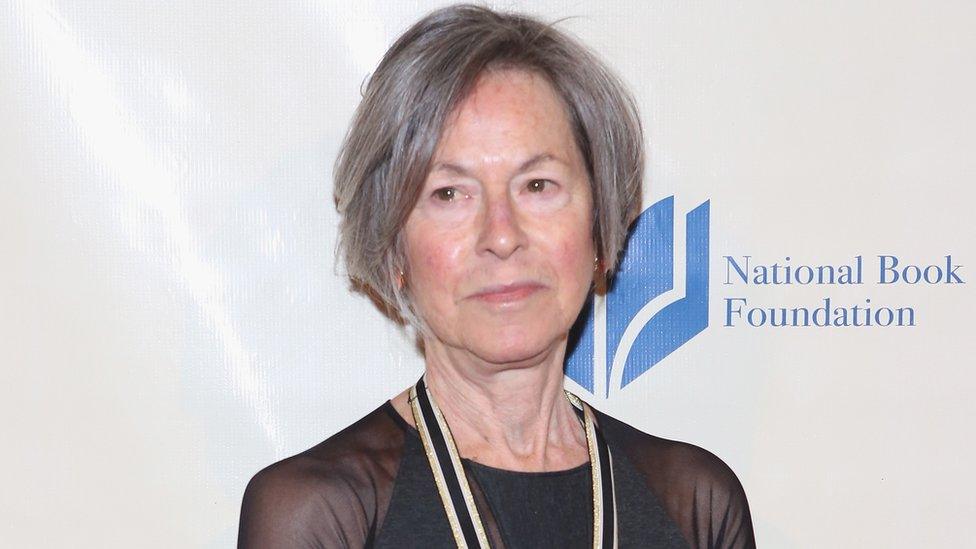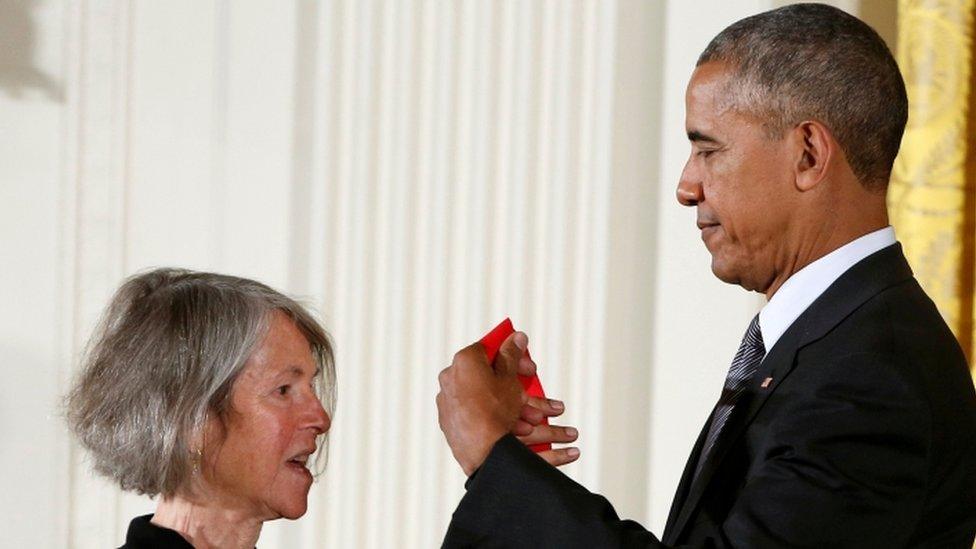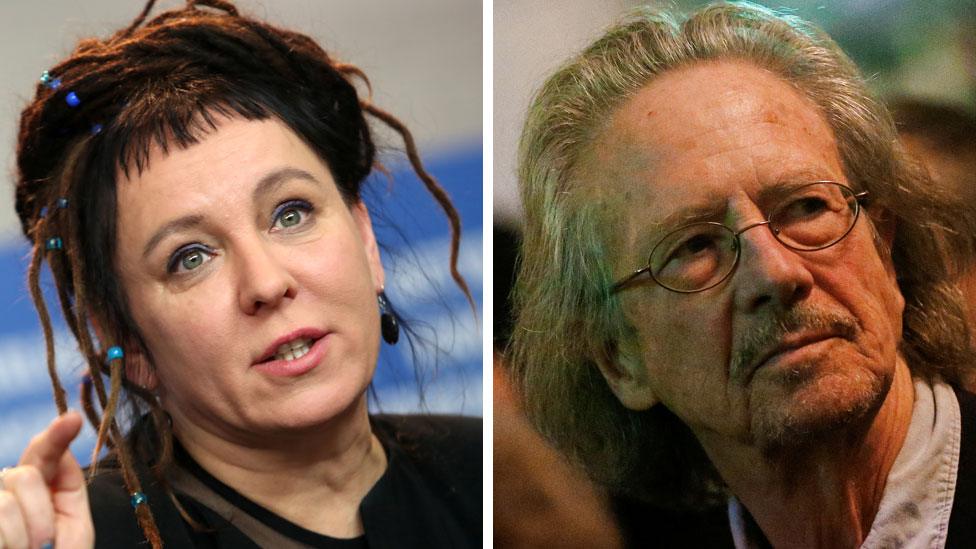Louise Glück wins Nobel Prize for Literature
- Published

This year's Nobel Prize for Literature has been awarded to the US poet Louise Glück.
Glück was recognised for "her unmistakable poetic voice, that with austere beauty makes individual existence universal" said the Swedish Academy, which oversees the award.
The Academy added she was "surprised" when she received their phone call.
Glück, born 1943 in New York, lives in Massachusetts and is also professor of English at Yale University.
The Academy's permanent secretary Mats Malm said he had spoken to Glück just before making the announcement.
"The message came as a surprise, but a welcome one as far as I could tell," he said.

In 2016 she received the National Humanities Medal from former US President Barack Obama
She is the fourth woman to win the prize for literature since 2010, external, and only the 16th since the Nobel prizes were first awarded in 1901. The last American to win was Bob Dylan in 2016.
Glück won the Pulitzer Prize in 1993 for her collection The Wild Iris and the National Book Award in 2014. Her other honours include the 2001 Bollingen Prize for Poetry, the Wallace Stevens Award, given in 2008, and a National Humanities Medal, awarded in 2015. She was also editor of the anthology The Best American Poetry 1993.
Allow X content?
This article contains content provided by X. We ask for your permission before anything is loaded, as they may be using cookies and other technologies. You may want to read X’s cookie policy, external and privacy policy, external before accepting. To view this content choose ‘accept and continue’.

Her poetry focuses on the painful reality of being human, dealing with themes such as death, childhood, and family life.
She also takes inspiration from Greek mythology and its characters, such as Persephone and Eurydice, who are often the victims of betrayal.
The Academy said her 2006 collection Averno was a "masterly collection, a visionary interpretation of the myth of Persephone's descent into Hell in the captivity of Hades, the god of death".

Olga Tokarczuk won for 2018 and Peter Handke was 2019's winner
The chair of the Nobel prize committee, Anders Olsson, also praised the poet's "candid and uncompromising" voice, which is "full of humour and biting wit".
Her 12 collections of poetry are "characterised by a striving for clarity", he added, comparing her with Emily Dickinson with her "severity and unwillingness to accept simple tenets of faith".
The prize is given to the person who has "produced in the field of literature the most outstanding work in an ideal direction".

Analysis by Vincent Dowd, Arts Correspondent
Even in their own country, few poets achieve true fame with the public in their own lifetime. But Louise Glück has been awarded almost every prize an American poet might hope for.
Among many other awards she took a Los Angeles Times Book Prize and spent a year as America's poet laureate in 2003/4 - though perhaps with a degree of reluctance at first.
Louise Glück (it's pronounced Glick) has made clear she sees herself as a private person. When she was given the Poet Laureateship she told the Boston Globe newspaper: "I have very little taste for public life." She added that she had thought she wasn't "the sort of person they'd ever look at".
Her first volume of verse - Firstborn - came out in 1968. Many of her works since have dealt with human emotion, childhood and the nature of life - often family life.
To sample her work, head for the short lyric Nostos (a Greek term meaning Homecoming).
The first lines are characteristic, being about memory:
There was an apple tree in the yard —
this would have been
forty years ago...
And the powerful last lines state one of her strongest beliefs:
We look at the world once, in childhood.
The rest is memory.
Her collection Ararat was described in the New York Times a few years ago as "the most brutal and sorrow-filled book of American poetry published in the last 25 years". Sadness and grief are certainly a frequent part of what she writes - yet she's seldom a depressing writer.
Glück's name was not widely touted this year as a possible Nobel laureate. Until now she has not been much read outside the US. At the age of 77, Glück can look forward to many new readers - and they can look forward to discovering a poet of insight and humanity.

Criticism of last year's winner
Last year's choice of Austrian novelist Peter Handke led to wide criticism.
Handke was a known supporter of the Serbs during the 1990s Yugoslav war and spoke at the funeral of former Serb leader Slobodan Milosevic, external, who was accused of genocide and other war crimes.
Last year also saw Polish author Olga Tokarczuk belatedly announced as the winner of the 2018 literature prize which had been suspended for a year after a sexual assault scandal and financial misconduct allegations rocked the Academy.
Normally, winners receive their Nobel from King Carl XVI Gustaf at a formal ceremony in Stockholm on 10 December, but the pandemic means it has been replaced with a televised ceremony showing the laureates receiving their awards in their home countries.

Follow us on Facebook, external or on Twitter @BBCNewsEnts, external. If you have a story suggestion email entertainment.news@bbc.co.uk, external.